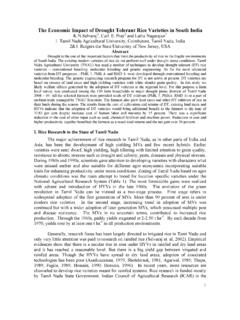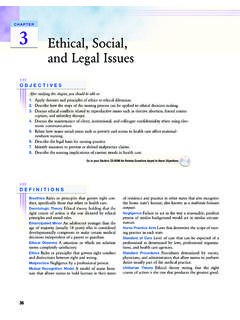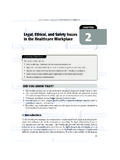Transcription of ETHICAL ISSUES IN HEALTH CARE REFORM
1 ETHICAL ISSUES IN HEALTH care REFORM . Mark H. Waymack Loyola University Chicago The subject of HEALTH care REFORM is much in our minds these days. On the one hand, it is difficult to find anyone who admits to being opposed to HEALTH care REFORM . On the other hand, I think we may all easily foresee it is going to be extremely difficult to come up with a HEALTH care REFORM program that will satisfy everyone. So, if almost everyone agrees it needs fixing, why is it so difficult for people to agree on what we should do to "fix" the HEALTH care system? I want to show that there are at least three different angles-three different perspectives-on HEALTH care and the "ethic" of HEALTH care . Each of these three perspectives has its own peculiar "ethic". and these ethics are all too often conflicting. Furthermore, not only do we find different people with different ethics approaching this issue from these different perspectives, usually each of us feels pulled by more than one perspective.
2 Thus, for any HEALTH care re- form program to really prove ethically satisfying and successful, it must somehow bridge or go beyond these disparate perspectives. Let me begin by outlining the different ethics of each of the three perspectives. HEALTH care as a Positive Moral Right As a nation, we have come to regard HEALTH care as something of a moral right. That is, individuals have a right to HEALTH care , and if a person has insufficient economic resources to pay for such care , we as a society have an obligation to see that poverty is not an obstacle to receiving HEALTH care . Behind this view is the assumption that HEALTH care is somehow morally different than other goods and services in our society. We feel no moral obligation to purchase a Cadillac Seville for each and every citizen. We even feel no moral obligation to purchase a used car for someone so he or she may drive it to and from work.
3 Neither do we feel we must purchase a big screen television for each house- hold that cannot afford one out of its own economic resources. But HEALTH care , somehow, is importantly, morally different. There are various kinds of arguments used to support this posi- tion. One might argue, for example, that if one's HEALTH is compro- mised, then one is unable to participate in our society. One does not 131. have the same access to the goods and services, jobs and rewards, as healthy people. Thus, our commitment to moral egalitarianism, to equal opportunity, requires that we, as a society, ensure that each and every citizen has access to HEALTH care . Indeed, equal oppor- tunity would appear to dictate not only that everyone have access to HEALTH care , but qualitatively equal HEALTH care . This moral commitment to the moral equality of individuals is al- ready present in our national system of organ distribution for trans- plantation.
4 No one can use his or her wealth in this country to pur- chase an organ, thus excluding people of more meager resources from the chance for an organ transplant to save or improve their lives. Rather, each and every one stands in a line-take a number and wait. The only thing that is supposed to advance you faster in line is a severe crisis in your medical status such that if you do not receive that organ soon you will die. A different kind of moral argument for this position might be one derived from a view of human life as "sacred," as being beyond price in its worth. Since life is sacred in a way that automobiles are not, we have a moral obligation to ensure that fiscal stinginess on our part does not result in the unnecessary loss of human life. I said earlier that we, "as a nation," hold to this view. Evidence for this claim can easily be found in the language behind the Medi- care and Medicaid acts of almost thirty years ago.
5 The Medicare act explicitly states that every older American should have access to the "best" medical care available without regard to his or her ability to pay. A similar spirit is behind the Medicaid program-that we, as a nation, have a moral obligation to ensure that extreme poverty not be a barrier to access to quality HEALTH care . This moral view, that each individual has a positive moral right to the highest quality HEALTH care , is an important assumption behind the Clinton HEALTH care REFORM proposals. Notice three key reasons the Clinton team offers for the necessity for REFORM : 1. First, there are currently some 37 million persons in America without any HEALTH insurance. Furthermore, a like number of Americans are grossly under-insured. 2. Second, even securely middle-class Americans are in great danger of losing their HEALTH care insurance. Since insurance companies are in business to make money, they are inclined to avoid subscribers who will make heavy use of medical services.
6 Hence, HEALTH insurers are apt to find ways to limit benefits to currently enrolled members, and are extremely apt to deny en- rollment to applicants with existing medical conditions. Since the cost of medical care can be so ghastly high these days, with- out decent HEALTH insurance the average middle class family can quickly become impoverished by a single major illness. Indeed, 132. the Clinton committee argues many Americans are scared away from starting small businesses because they cannot afford the high premiums insurance companies may demand. As the Clin- ton HEALTH care REFORM committee argues, middle class Ameri- cans are afraid to switch jobs because of the prospect of losing their HEALTH insurance; and they are scared that through cata- strophic illness they may lose meaningful coverage even if they do not lose their jobs. 3. The Clinton committee is eager to assure Americans it will not ration care .
7 It holds we should be increasing access to care , not restricting access. Hence, the Clinton REFORM proposal is ex- plicitly anti-rationing. It is not a REFORM program designed to withhold or ration services. What ties each of these three points together is the notion that Americans should not be vulnerable to loss of access to HEALTH care . Rather, access to HEALTH care should be guaranteed morally. Clearly, such reasons for HEALTH care REFORM only make sense if one is com- mitted to the position that each individual has a positive moral right to HEALTH care . Not surprisingly, the American Medical Association (AMA) is in favor of HEALTH care REFORM . Physicians, at least at times in their pro- fessional history-and the late twentieth century has been one of those times-have held that they have a moral obligation to promote the medical welfare of their patients as individuals.
8 Clearly, if a pa- tient cannot obtain medical services because of an inability to pay, then that patient's medical interests are not being best served. Hence, the AMA has come down squarely on the side of universal access. (Of course, one may be cynical and point out that physicians are liable to have more income-producing business if there is gov- ernmentally paid universal access, but I leave that point for a few minutes). Clearly, if we believe HEALTH is a positive moral right of each and every individual, then the existing HEALTH care system (insofar as it can even be called a "system") is a moral travesty. Each and every day millions of Americans are denied access to basic, primary HEALTH care because they cannot afford it. Many of them get sicker and sicker until what had been a simply correctable, treatable problem becomes a life threatening nightmare. The way HEALTH care is now delivered (or not delivered) to individ- uals shows little or no respect for a positive moral right to HEALTH care .
9 To meet this moral demand in a minimal sense will require a HEALTH program providing universal coverage. And in a stronger sense of egalitarianism and the value of human life, a suitable HEALTH care REFORM proposal should provide not only for access to minimal HEALTH care , but rather for the highest quality HEALTH care available. 133. HEALTH care and the Ethic of Business HEALTH care has never been a completely charitable endeavor. Through the ages, physicians have typically felt some professional moral obligation to provide some care to the indigent, but (at the pro- fessional level) it has usually been at the margins. After all, physi- cians, like most of us, have themselves and their families to financial- ly support. With regard to hospitals, the story is a bit more complex. For much of the history of medicine, the economically advantaged re- ceived their HEALTH care in the home.
10 Physicians made house visits and, when necessary, nurses or other care givers were available, either from family or from hiring. Hospitals, for the most part, were charitable institutions designed to provide a place of care for those so destitute as to not have care available in the home. But as medical science and technology developed, the hospital became an integral locus of HEALTH care delivery, whether for rich or for poor. Then, the post World War II period saw a mushrooming of employer-paid HEALTH insurance programs, such as Blue Cross/Blue Shield. This meant hospitals would receive adequate reimbursement for the hos- pitalization of a far greater portion of the American population than ever before. Finally, the institution of Medicare and Medicaid, near- ly thirty years ago now, meant hospitals were being compensated for care that previously had been charitable.



















